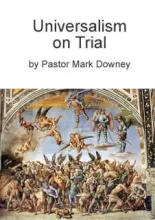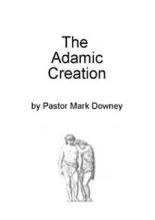Suppose Satan is Real: What Difference Does It Make?
by Pastor Mark Downey
What seems to be important to us isn't necessarily on the front burner for other people in our Movement. So we need to examine priorities and find the unity that will motivate us to reprioritize a singleness of purpose and overcome the stumbling blocks that splinter us historically and spiritually. You may recognize this title from the often repeated 'Suppose We are Israel - What Difference Does It Make?'. It's a good question, especially if some people put forth a proposition that is paramount to their ideology.
When discussing 'satan', we are not dealing with something as tangible as a race of people claiming to be the Israel of scriptures. In essence, the nuclear message of Christian Identity has always been predicated on the reality of people fulfilling a certain role. The thing that is frustrating our Movement, more than anything right now, is the identification of jews in a proper biblical perspective. Some go so far as to say that you can't understand the Word of God or what's going on in the world unless you accept the satanic seedline of jews.
Very elaborate extrapolations expound at great lengths to convince people of this pressing priority. What's interesting about this premise is the very nature of satan, according to their definitions, and its reality. It does make a very big difference as to how we define this word. In fact, it makes a difference as to whether or not the Hebrew word 'satan' is transliterated or translated, the former of which it was not. Had it been translated properly as 'adversary', we wouldn't have the problem of a fanatical interpretation and an entire theological doctrine dominating a religious movement.
Indeed, the personified Satan preoccupies judeo-Christianity as well, although with far fewer critics as to its supposed reality. The attribute of Satan as a proper noun promotes the concept of a supernatural being. What difference does this make? Well, if it doesn't harmonize with the rest of Scripture, the obvious discrepancy becomes the reality. What do these proponents of a supernatural satan mean by real? We've heard everything from satan being an ugly hook nosed, pointy eared, lizard tailed, horned monster to the most beautiful of the heavenly angels who fell from grace. Maybe he's a changling or shape shifter! You can take your pick from this selection of different realities, but it might get a little confusing if you don't totally accept it. By the way, just to make it perfectly clear, those of us who don't buy into the satanic seedline theory, do believe that there are satans in the world, but they are merely human adversaries.
The antichrist jew is a very real adversary without the supernatural trappings. Hypothetically then, let's suppose that the Satan of the Seedliners is a discernable reality to our five senses within the three dimensions of known science. Otherwise, the reality would be speculative rather than real, would it not? If satan is real, then what characteristics of Christianity distiguishes itself from other religions? Actually, the contrast may not be that great in light of comparative religion courses taught in universities and colleges. Many religions per se of the world, both ancient and contemporary, civilized and uncivilized, hold to the belief in two supreme principles, one good and the other evil.
When asserting opposite terms as dualistic, the intent is not to just acknowledge their dissimiliarity, but primarily to insist that it is impossible to reduce their differences any further. If Christianity is dependent upon a real satan, then the dualism is an absolute. God's Word is absolute, but is Christianity dualism in the sense of two supernatural beings? Ironically, the ancient Persian religion of Zoroaster proclaimed an irreducible opposition between Ahura Mazda, the Wise Lord and Angra Mainyu, the Evil Spirit. The first incarnates truth, righteousness and order, while the latter represents the lie, unrighteousness and disorder.
Historically, Christian dogma has denounced dualism as a heresy and condemned it repeatedly, not from the simple fact that there is a radical difference between good and evil or the sacred and the profane. No, the rejection is directed against the metaphysical or supernatural manifestation of some personage spoiling God's creation. This is the stuff of mythologies and superstitions, whereby the priestcraft inculcates a supernatural destroyer and tempter of man. If this Satan is the personification of cosmic evil and not the adversarial agency of man alone, then how can Christianity maintain a monotheistic position?
The first commandment must have meant that "other gods", specifically the supernatural satan types, were real. That would make a difference as to what type of religion Christianity is. If we believe Satan is a real spiritual being, existing outside our normal senses, and God permits this satanic power to coexist in His creation, being able to influence and entice man to sin, not directly, but through our carnal desires, then what difference does that make to our faith and our belief in God? The difference would be who or what is responsible for acting contrary to God. With a vicarious cause for transgression, we can be persuaded to think that something outside of ourselves prompted the sin. We, therefore, can substitute our guilt to a scapegoat that is quite real in our minds. Add the Holy Spirit of God to our every day life, a mentality from God to remove ourselves from evil, and we become the rope in a tug of war between God and Satan. The entire issue is reduced to the mental assent of perceived biblical realities to have a firm or wholehearted religious conviction.
This concept of being fully persuaded about the reality of the truth or the truth of a reality is self explanatory in the New Testament as a matter of trust and obeying the simplicity that is in Christ, with the understanding that His Word is the value in which we honor Him. If we don't give God all the praise, glory and honor, which simply means all the attention, credit towards His reputation and recognition of His exclusive power, then someone or something else is receiving attention, credit and recognition that belongs to God alone.
If Satan is real, we have to share our beliefs with two supernatural beings, God and Satan. It's the difference between dualism and monotheism. We cannot believe both of these concepts for that would be double minded. There's an axiom that pertains to this hypothesis that we've been exploring and it is this: When men give anything the power to do great things, that is equal to worshipping that thing.
It is possible that the 'synogogue of satan' referred to in Rev. 2:9 was a form of dualism which applied to some early sects of first century Christianity. The identification of the serpent with the devil lead some of these groups to his worship, to a belief in a real Satan. The Ophites were a branch of the Gnostics during the second century AD, and they attached special importance to Satan as the tempter in view of their great respect for gnosis, the knowledge of good and evil which the Serpent had enabled man to obtain. They said God withheld this knowledge from Adam and that the Serpent was the real liberator of mankind since he taught men to rebel against God (as if man needs any help!). These believers in a real Satan venerated the rebellion of Cain, Esau and Sodomites as heros. They worshipped Korah (one of Esau's sons), and especially Judas Iscariot from freeing mankind from Jesus.
Babylonian dualism was brought into contact with Christian thought through the cult of Manichaeism, circa third and fourth century AD, which reintroduced or reinvented the fantastic fables of ancient mythology. It borrowed from various religions to form an elastic and a convenient eclectic solution to the problem of good and evil. The forbidden fruit of Genesis, which the Gnostics exalted, became the theological source of the dualist doctrine of two coexisting realities, whereby Satan made an incursion into God's Kingdom and penetrated the earthly dominion of Adam-man.
In all the dualist sects, there is a glorification, not praise, but an officially established dogma put on a pedestal of a real supernatural devil, because the essence of dualism is dependent upon placing the devil highly up in status as God's rival, eternal and independent of Him. When their dogmatic perspective of the universe resurfaced in the 10th century, under the guise of the Bogomils and Cathari, their heretical reputation was contained secretly in groups known as Luciferians, who worshipped the devil under the name of Satanael, or of Sammael. This cult is mentioned by the 11th century Byzantine writer Euthymius Zigabenus as prevalent among the Bulgarian Bogomils, who held the notion that Satanael seduced Eve and that he, not Adam, was Cain's begetter.
They also put forth the idea that dualism means the belief that goodness exists only in the spiritual world of the good god; while the material world is evil and was created by an evil god or spirit called Satan and therefore Good and Evil have two separate realities. These doctrines of creation led them to rewrite the biblical story and, like all dualists, they established an elaborate mythology to replace it, and in so doing, reject the canon of scripture as holy and sacred. The dualist's interpretation of history is this constant temptation from Satan and his demonic agents to bind men to evil by means of materialism, carnality, error and false religion. The visible world, as they understand it, is in the realm of the evil one and all contact with matter and flesh, which are the devil's best instruments for gaining mastery over men's souls, should be avoided and denounced. The problem with this drastic theology is a denial of the physical messianic incarnation of Jesus Christ and the Christian concept of material matter as a vehicle of grace. Conversely, dualism advocates that good spirits, or agents of God, can save man, only by imparting to them the true gnosis concerning the forces of nature.
If all of this sounds vaguely familiar, it indeed corresponds to a religious undercurrent in Christian Identity called the Two Seedline theory. The satanic seedliners do not suppose or hypothesize. They, in fact, believe that a supernatural being named Satan is real. They may object to the analogy of dualism or even the troublesome question as to what difference does it make. I think it makes a difference to God as to how we read and believe His Word. That's got to be an important priority, because if we start out on a false premise, our understanding of divine intent will fail us and we will not help towards the advancement of Christianity.
As we study comparative religions that have come and gone, we can identify what was right and wrong. The inspired teachings and principles of scripture compared to the heresies and traditions of man basically remain the same. There is nothing new under the sun; just the magician's illusions in presentation. Thus far, I have not offered any scriptures refuting this inane presumption about satan, because I wanted you to imagine the mindset that it takes to accept it as a reality; to put yourself in the shoes of a dual seedliner. So let us now rephrase the theme by asking: What if Satan is not real? Can Christianity Survive? What saith the Word of the Lord God of Israel?

 "For thou art an holy people unto the Lord thy God: the Lord thy God hath chosen thee to be a special people unto himself, above all people that are upon the face of the earth."Deuteronomy 7:6
"For thou art an holy people unto the Lord thy God: the Lord thy God hath chosen thee to be a special people unto himself, above all people that are upon the face of the earth."Deuteronomy 7:6







